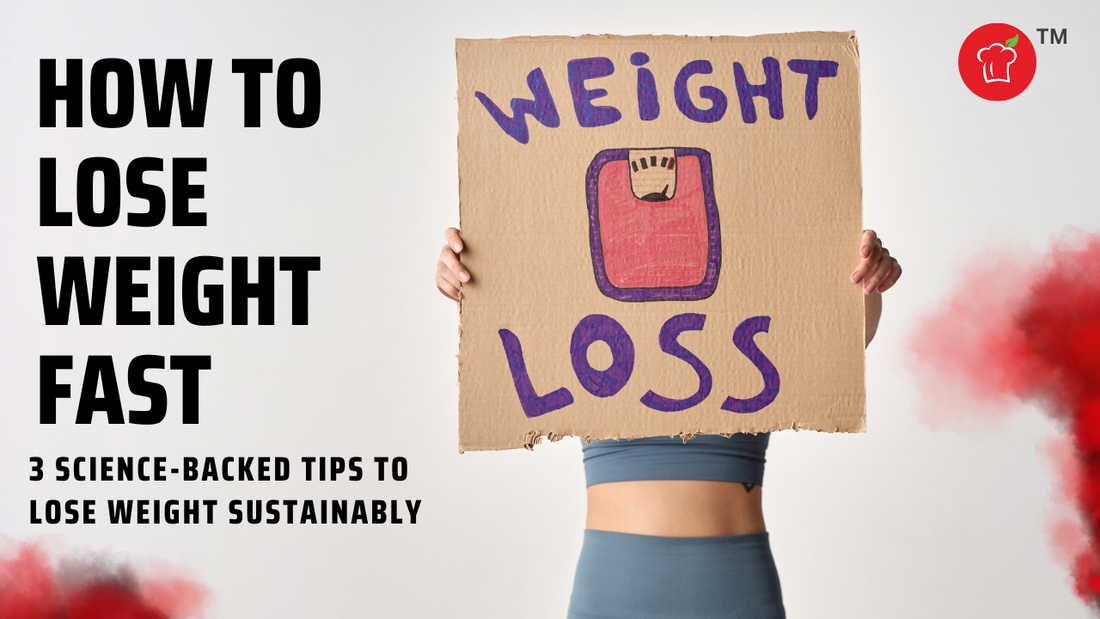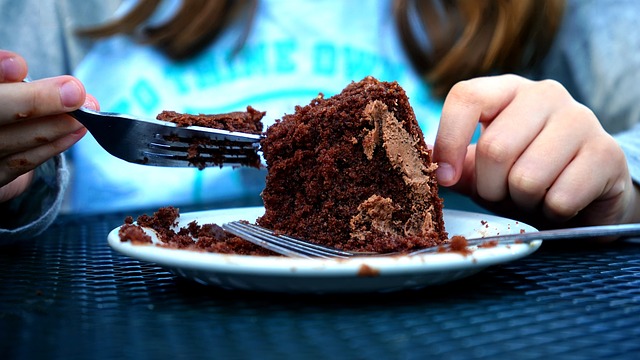How To Lose Weight Fast: 3 Science-Backed Tips To Lose Weight Sustainably
Struggling to lose weight?
You are not alone.
Millions of individuals suffer from the same problem, trying desperately to shed those extra pounds through diet and exercise.
It can be an arduous journey, but with the right strategies in place it is possible to achieve success in a healthy and sustainable way.
In this article we provide three science-backed tips that will help you on your path towards losing weight fast - without sacrificing your long-term health or well-being.
Excess body fat has become one of today's leading public health concerns, contributing to numerous chronic diseases such as diabetes, heart disease, cancer, and more.
For many people, taking steps towards achieving a healthier lifestyle can prove difficult due to factors such as busy schedules, poor eating habits, lack of motivation and discipline.
Despite these challenges, there are strategies that have been scientifically tested and confirmed that when followed correctly, can lead to significant reductions in excess body fat within a short period of time.
The key lies in making steady big changes over time rather than attempting small measures which often fail due to their minimal results.
Our three science-backed tips focus on changing dietary patterns while also introducing physical activity and other healthy lifestyle changes into daily routines – critical components for successful long term weight loss management plans.
By following our advice, readers may learn how to make simple yet effective adjustments over time that will result in lasting results both physically and mentally.
Define Your Goals
Goal-setting is an important part of any weight loss journey.
When it comes to losing weight, setting measurable and achievable goals can help keep you on track for success.
Consider your overall health as well as what you want to achieve in terms of body composition or physical fitness level.
After identifying realistic goals, break them down into small steps that are easy to follow and measure progress towards your ultimate goal.
For instance, if your goal is to lose 10% of your body weight over the next 1 year, set weekly targets such as one or two pounds per week or less.
On the Sampoorna Ahara Weight Loss Program, our clients lose between 200g to 1kg of excess body weight every week until they reach their ideal weight.
Anywhere within this range is a good target to set.
It’s also wise to focus on lifestyle changes rather than quick fixes when trying to lose weight sustainably.
Incorporating healthy eating habits like consuming more fruits & vegetables, avoiding oils including olive oil while reducing portion sizes helps reduce caloric intake without sacrificing nutrition.
Regular exercise increases metabolic rate and reduces blood pressure levels, which may further contribute to successful long term weight loss efforts.
Calorie Counting Vs Calorie Dilution
Calorie counting and calorie dilution are two methods of achieving a healthy weight loss goal.
A comparison between these two approaches can help us understand their potential to create a sustainable lifestyle change for long-term success.
To illustrate, imagine the process as driving with either your foot firmly on the brake or slowly releasing it to maintain control.
In terms of calorie intake, both strategies focus on creating a caloric deficit to achieve successful weight loss; however, they differ in how that is accomplished.
Calorie counting emphasizes reducing food consumption directly by limiting overall energy taken in each day through an individual's diet.
On the other hand, calorie dilution involves reducing one’s total daily calories while increasing intake of foods rich in fiber and water, such as fruits, vegetables, whole grains, water, and low-calorie beverages like green tea instead of overconsuming calorie dense foods high in refined carbs and added sugar.
By doing this, you may still feel full without taking in excess calories from unhealthy sources.
We call it the 'Eat More, Weight Less' approach.
These two approaches provide viable solutions for controlling calorie intake and reaching desired weight goals without compromising nutrition or dietary health needs.
We have found calorie dilution to be more effective in consuming less calories without the hunger pangs that come with portion control.
Making consistent changes towards healthier choices will lead to positive results when combined with regular physical activity and an understanding of important nutrient requirements from whole foods sources.
Eat A Balanced Diet
In order to achieve sustainable weight loss, it is essential to focus on a healthy diet.
Eating a balanced diet is the key element in successful and safe weight management.
This entails consuming healthy foods that are rich in nutrients while being mindful of one’s food intake.
A well-balanced diet should include all macronutrients such as proteins, fats, carbohydrates and fiber; micronutrients like phytonutrients, minerals and vitamins; and fluids for hydration.
It is important to note that eating too much calorie dense foods can result in extra calories which will lead to an increase in body fat instead of muscle mass or bone density.
To prevent this from happening, individuals must ensure they stick within their daily caloric requirements based on their age, gender and activity level.
Choosing whole plant foods can help with this without worrying about counting calories with each meal.
Consuming meals with adequate portions of each macronutrient throughout the day helps maintain energy levels whilst providing sufficient nutrients needed by the body.
Additionally, avoiding processed foods containing high amounts of unhealthy trans fats may help reduce total calorie intake without sacrificing taste or satisfaction during mealtime.
These recommendations offer possible solutions towards achieving sustainable weight loss through creating a healthier relationship between food consumption and overall health outcomes.
Eat More Whole Plant Foods
Achieving a healthy weight is like navigating an obstacle course; you need to be strategic and purposeful in the decisions that you make.
Eating more whole foods is one of those important decisions, as it can help prevent excess calories from entering your body while providing essential nutrients for optimal health.
Whole plant foods are minimally processed or unprocessed ingredients from plants such as vegetables, fruits, legumes, nuts and seeds, and whole grains.
Replacing refined grains like white rice with whole grains such as brown rice can also provide fiber and other vital vitamins and minerals needed by the body.
Studies suggest individuals who eat more whole foods tend to lose around one to two pounds per week without compromising their nutrient intake.
Think of it like this: It is easier to eat an extra fruit than eat less pasta - both of which have the same health benefit!
Incorporating these natural sources into your meals increases satiety levels due to their high-fiber content which helps manage hunger cravings throughout the day.
For example, try adding a fruit and a salad at the start of your every meal for a week and see how it goes!
This way you can enjoy all the benefits of healthy eating without falling prey to overconsumption and unhealthy snacking habits often associated with processed diets.
Cut Out Refined & Processed Foods
There is no doubt that weight gain can be a complex issue, and it often takes more than just fad diets to make meaningful progress.
Cutting out processed and refined foods from our diet is one of the most effective ways to achieve sustainable weight loss.
By avoiding unhealthy or junk food, such as white rice, we are able to focus on consuming wholefoods which offer us nutritionally dense meals with fewer calories.
Not only does cutting out processed and refined foods provide us with healthier options for meal times, but also helps reduce calorie intake – an essential part of any successful long-term weight loss plan.
Eating unprocessed, real foods encourages people to become mindful about what they’re eating, making them less likely to overindulge or binge eat when temptations arise.
Furthermore, replacing processed snacks with fresh fruits and vegetables means that your body will be provided with all the vitamins and minerals it needs in order to function at its best.
Plan your meals and snack times in advance with healthier options.
For example, all 200+ products and meal plans on SampoornaAhara.com are free from processed foods.
You can also access 200+ recipes for FREE on NutritionScience.in Plant-based Recipes Online Course.
Add Fat Burning Spices
"You are what you eat," as the old saying goes.
While it is an oversimplification, there is truth to this adage when talking about weight loss goals.
For those looking to shed body fat, including certain spices in their diet may be helpful.
Different spices have been proven to increase metabolism and burn more calories while suppressing sugary cravings.
Additionally, some of these spices can help to keep us feeling full longer by providing a greater amount of satiety than processed foods with empty calories provide.
One example would be ginger root, which has long been used for its anti-inflammatory properties but also helps regulate blood sugar levels and reduce feelings of hunger due to its ability to slow down digestion.
Other common fat burning spices include:
- Turmeric
- Pepper
- Chili
- Garlic
- Kalonji or black cumin
- Cardamom
- Cinnamon
All of these contain large amounts of antioxidants that boost our immune system as well as increasing thermogenesis (the process where our bodies convert food into energy).
Therefore utilizing both fats burning spices along with your daily meals can expedite weight loss progress significantly if planned correctly.
Bonus Tips: Sleep, Water, Exercise& Stress
Incorporating bonus tips such as healthy sleep, water, exercises and stress in your weight loss journey is an essential component for success.
All of these elements work together to help you reach your goals sustainably and efficiently.
When it comes to sleeping, the amount and quality of rest can influence how much energy we have during the day and how well our metabolism functions.
It's recommended that adults get 7-8 hours of sleep per night; however, each person’s needs may vary depending on their lifestyle or health condition.
Drinking enough water is also key for optimal bodily functioning – aim for at least 2 liters a day if possible.
Additionally, regular exercise like yoga or weight training has been proven to burn calories and achieve calorie deficit while promoting mental wellbeing which further helps with successful weight management.
Finally, managing stress levels should be taken into consideration when trying to lose weight fast – consider taking time out of your week to practice mindfulness activities like yoga or meditation so as to better manage any emotions that could hinder progress towards your goal.
How To Avoid Emotional Eating
Weight loss efforts can be greatly hindered if you do not address emotional eating.
Emotional eating is a process where people eat in response to their emotions, instead of hunger levels.
This could mean that they are consuming more calories than their daily calorie intake should be and thus making it difficult for them to achieve their weight-loss goals.
Therefore, it is important to learn how to manage emotional eating so as to make sure your weight-loss efforts are sustainable.
One way to avoid emotional eating is by planning your meals and snacks in advance.
If you always have healthy options available, it is easy to eat healthy when the hunger pangs hit you. Avoid sugary foods by ensuring there are none around.
Another way is to eat the right quantity of food at each meal.
It's important to recognize when you're full and stop eating before reaching the point of overeating or feeling uncomfortable with what has been consumed.
It also helps to become aware of any triggers that prompt emotional eating and try out different strategies such as deep breathing or going for a walk when those feelings arise.
Additionally, engaging in enjoyable activities that don’t involve food may help distract from negative emotions and reduce stress levels which can trigger cravings.
Taking regular breaks throughout the day will also ensure an adequate amount of rest while keeping energy levels up and preventing boredom-induced snacking sessions
Monitor Your Progress
The National Family Health Survey is the most comprehensive household survey of health and social indicators by the Government of India.
According to the latest survey (NFHS-5), nearly 23% of men and 24% of women in India were found to be overweight with a body mass index (BMI) of 25 or more!
This statistic is a testament to the fact that weight loss can be an arduous journey for many people.
To help individuals on their path to sustainable weight loss, monitoring progress is critical.
Weight management cannot be achieved overnight; it takes time and commitment from both physical and mental perspectives.
Tracking exercise routines and diet changes can provide insight into what works best for individual body types in terms of losing fat while preserving lean muscle mass.
Additionally, assessing metabolism health can alert if adjustments need to be made along the way as metabolic rates vary person-to-person.
Regularly evaluating progress helps keep motivation levels high during times when rapid weight loss is not possible or desired.
It also serves as reminder of how far you’ve already come in your weight loss journey and encourages further dedication towards achieving goals.
The act of tracking alone may even cause shifts in lifestyle behaviors that promote better results over time.
Seek Professional Guidance
Achieving successful weight loss can often feel like an elusive goal.
One of the most crucial steps to take on your weight-loss journey is to seek professional guidance from a qualified health care provider or nutritionist.
The benefits of professional support cannot be overstated and it is key for anyone looking to manage their weight in a healthy, sustainable way.
A qualified health care provider or dietitian can help you develop an individualized diet and exercise program tailored to meet your needs as well as provide advice about reducing daily calorie intake safely and effectively.
They will also monitor your progress and provide ongoing motivation and accountability towards meeting your goals.
When seeking professional guidance, make sure that the person has experience in helping people with their weight management goals and that they are up-to-date with the latest research regarding safe and effective methods for losing weight sustainably.
The Sampoorna Ahara Weight Loss Program can help you with a professional, scientific approach to sustainable weight loss. Have you tried it yet? You can explore it here.
Frequently Asked Questions
What Are The Best Exercises To Help With Weight Loss?
When looking to lose weight, many people think physical exercise is a key factor in achieving desired results.
However, science has found that exercise plays only 10-20% of the role in any weight loss approach. 80% comes from your diet and nutrition intake.
Having said this, exercise is a key factor in achieving better physical fitness and overall health.
Here's how it helps.
Exercise helps the body burn calories which can help with overall weight loss and maintenance of that weight loss.
Researchers have identified certain forms of exercise as being more effective for losing and maintaining weight than others.
High-intensity interval training (HIIT) has been found to be an effective form of exercise for those looking to lose weight quickly and sustainably.
HIIT involves alternating periods of intense activity with short rest breaks.
This type of workout increases the heart rate and can burn fat faster compared to other types of exercises such as jogging or cycling.
Studies suggest that people who perform HIIT regularly are likely to experience greater reductions in total body fat percentage when combined with dietary modifications.
Additionally, strength training has also been shown to be beneficial for individuals looking to achieve significant changes in their physique and composition over time.
Strength training focuses on building muscle mass while burning calories at higher rates than traditional aerobic workouts.
Research indicates that even small amounts of resistance training can lead to increased metabolism, improved bone health, reduced risk factors associated with chronic disease, and enhanced mental wellbeing – all important elements contributing towards successful long-term weight management goals.
It is important to remember that no single form of exercise will guarantee success; rather it should form part of an overall healthy lifestyle approach involving dieting and physical activity habits tailored specifically towards individual needs and preferences.
Therefore, engaging in regular physical activities including both high intensity interval training (HIIT) and strength building exercises could prove highly beneficial for anyone wishing to achieve sustainable weight loss goals over time.
How Much Water Should I Drink Daily?
It is ironic that often the simplest of solutions to a complex problem are overlooked.
In this case, the answer to how much water should one drink daily for weight loss may be easier than expected.
In order to sustainably lose weight and maintain it over time, proper hydration is essential.
Drinking enough water helps to increase metabolism and regulate body temperature as well as flush out toxins from the body.
The recommended amount of water intake varies based on individual factors such as age, gender, and physical activity levels.
Generally speaking, medical experts suggest drinking between 2-3 liters per day or 8-12 glasses in total for adults.
This number can go up depending on personal needs like exercising regularly or residing in hotter climates.
It is advised to have small sips throughout the day rather than gulping down large amounts at once; this helps constantly keep the body hydrated without feeling uncomfortable due to fullness or putting undue strain on the heart or kidneys.
Hydrating with an adequate amount of water each day not only helps boost metabolism but also reduces cravings thereby assisting with achieving successful long term weight management goals.
The best time to drink when it comes to weight loss is two glasses just before your meal - this helps you feel fuller with less calories and lose your excess weight faster.
Therefore, paying attention to your daily water intake will help you stay healthy while losing those extra kilos!
How Do I Prevent Overeating Due To Stress?
It is no surprise that stress can lead to overeating.
But this behavior, while common and understandable, often has the opposite effect of achieving desired weight loss goals.
Fortunately, there are proven strategies for avoiding or mitigating excessive eating due to stress.
One way to prevent overeating due to stress is through mindful eating techniques.
Instead of mindlessly snacking in response to an emotional trigger such as boredom or anxiety, these techniques encourage individuals to be more aware of their thoughts and feelings before selecting a food item.
By focusing on hunger signals rather than emotions when deciding what to eat, one can make better decisions about portion size and type of food consumed.
Additionally, it’s important to take time away from stressful situations by engaging in soothing activities like yoga or meditation.
Doing so helps keep cravings at bay while also providing an opportunity for reflection on how best to handle any given situation without resorting to unhealthy coping mechanisms such as binging on calorie-dense foods.
For those who find themselves constantly reaching for snacks out of habit or convenience rather than hunger, creating healthy meal plans with balanced meals may help break the cycle of mindless eating caused by stress.
Planning ahead reduces decision fatigue associated with making frequent food choices throughout the day which can prevent overconsumption of calories later in the evening.
Moreover, preparing meals ahead of time allows individuals to ensure they are consuming nutrient dense foods instead of relying solely on processed snack items which provide little value nutritionally but are often chosen during times of heightened emotion or distress.
By implementing mindful eating practices and developing healthy meal plans that incorporate nutritious foods into daily routines, individuals have a much greater chance of curbing compulsive overeating tendencies brought on by stress and ultimately reach their weight loss goals sustainably.
How Can I Track My Progress?
Tracking progress is an essential part of losing weight effectively.
It can be difficult to stay motivated when it comes to dieting and exercise, but the rewards that come with tracking progress are immense!
By monitoring how much weight you’ve lost or gained over a period of time, you can ensure that your goals remain on track and make adjustments if needed.
The importance of this cannot be exaggerated - staying focused and engaged in the process will help keep your motivation high.
Tracking your progress also allows you to assess whether any changes need to be made in order for you to reach your desired end goal.
This could include changing up your workout routine or adjusting portion sizes at meal times.
As a medical professional, I recommend keeping detailed records such as calorie intake and physical activity levels so that you have a clear picture of where you stand in terms of achieving the results that you desire.
It's important to remember not only short-term successes but also long-term ones too; taking regular measurements, weighing yourself weekly or monthly, writing down what foods were eaten each day – all these steps taken together will give an accurate assessment of one’s journey towards their weight loss goals.
Keeping track of everything helps identify areas which may require more focus so that lasting success can be achieved without reverting back into old habits.
Are There Any Dietary Supplements That Can Help With Weight Loss?
The objective of losing weight sustainably is an important one.
Unfortunately, most dietary supplements have been found to cause more harm than good when it comes to weight loss.
Research suggests that certain natural ingredients may have beneficial effects when it comes to appetite suppression, fat burning, metabolic rate increase, and decreased cravings.
Examples include green tea, chili and nutritional yeast.
It is advisable to consume these as foods and not as supplements to ensure they are safe and effective without compromising overall health status.
Healthy lifestyle changes are necessary components of successful long-term weight control strategy.
A balanced diet consisting primarily of whole plant-based foods along with regular physical activity are key elements needed for sustained success in reaching desired goals.
Furthermore establishing realistic expectations is important both for short-term progress tracking as well as long-term motivation towards maintaining results over time.
Conclusion
Recent studies show that approximately one-fourth of Indians are overweight or obese.
This is a concerning statistic, as obesity can lead to an increased risk for developing serious health complications such as type 2 diabetes and cardiovascular disease.
Thus, it is important to take the necessary steps to ensure healthy weight loss through diet and exercise in order to reduce these risks.
In conclusion, engaging in regular physical activity in combination with mindful eating habits can help individuals reach their desired weight goals safely and sustainably.
In addition to setting realistic expectations about the amount of time needed for successful weight loss, tracking progress daily or weekly can help hold oneself accountable and stay motivated.
Finally, avoiding crash diets or excessive fasting may be beneficial for long-term success.
By following these science-backed tips, you may be able to achieve sustainable weight loss without risking your health.
Next Steps - Get Started Today
Looking to eat healthy? We can help. You can prevent, treat or better manage a lifestyle disease
- Book an online consultation with Dr. Achyuthan Eswar to learn how best to deal with it.
- Sign up for our Plant Based Diet Masterclass on NutritionScience.in to better understand the numerous benefits of adopting a whole food plant based diet.
- Access our free course to help kickstart your plant based food journey.
- Subscribe to our 100% whole food plant based balanced meal plan, delicious & doctor designed to help you get all your macro and micro nutrients, from the comfort of your home - Bengaluru only
- Our Healthy Executive Thali Subscription is packed with variety and affordable too - Bengaluru only
- Stock up on delicious sweets and snacks that are sugar/jaggery-free, oil-free, maida-free and plant-based - Available Pan-India
- Pizzas, Biryani, Parathas, Burgers and more! Check out our instant meals and special meals here














